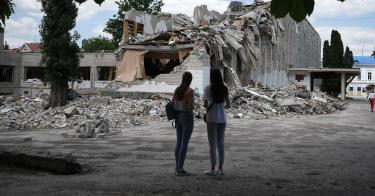Wars capture the imagination of historians. They also shape the treaties signed after the fighting ends. Those pacts help determine the political, social, and economic order for years to come. Treaties should set the foundation for a peaceful future. But when written haphazardly, they can sow the seeds of the next conflict.
In Ukraine, the fighting and dying continues. Even so, it is time to start thinking about how to shape a future that promises the transatlantic community a new era of stability, peace, and prosperity.
Despite the many differences among the family of Western nations, there is a universal consensus that a free, thriving, and secure Ukraine benefits us all. How likely is that to happen?
There are numerous alternative scenarios for how this war may end, from the total collapse of the Russian imperial kleptocracy, to a Ukrainian flag waving in Sevastopol, to a prolonged war of attrition that results in the devastation and slow collapse of Ukraine. The latest news from the battlefield suggests the conflict will wind down at some indecisive place where neither side achieves its maximalist goals.
>>> Ukraine War, Day 100: Raising the Cost for Russia’s Naval Blockade Can Avert a Prolonged War
Some voices, including the Italians, French, and Henry Kissinger are calling for an immediate ceasefire and Ukrainian concessions. In practice, that would not end well for the West. It would give the Russians time to regroup and flex their economic muscle (e.g., leverage via energy supplies) to pressure the West to roll back some of the sanctions and stop arms shipments to Ukraine.
We need the foundation for a real peace. A rush to press for ending the fighting without safeguarding Ukrainian vital interests—or allowing Russia to come out of it without being held accountable for its crimes and enriched with new territory—will only increase the threat of future Russian aggression.
This war started because the rules-based order failed and force prevailed. Only force and the will to use it will bring stability, establishing the conditions for ending the threat to the transatlantic community.
Regardless of how the war on the ground ends, NATO must be prepared to deter future aggression with a robust, forward-deployed conventional military and the means to secure abundant, reliable, affordable energy without being dependent on Russia.
The transatlantic community will also have to help lay the foundation for a Ukraine that can defend itself against future Russian aggression. That includes helping Kyiv build the capacity to break Russia’s blockade of grain exports, defend Ukrainian airspace from air and missile attacks, and secure Ukrainian territory.
This will require Western countries to make bolder efforts to supply the arms and ammunition needed to accomplish these tasks, along with the requisite logistical, training, and intelligence support. Rather than increasing the risk of expanding the war, a more aggressive effort is likely to wind down the war more quickly and ensure it doesn’t start up again.
In addition, it is a Western interest to speed up Ukraine’s economic recovery. Reconstruction costs may reach $1 trillion or more. Russia must be forced to pay war reparations to Kyiv through its foreign currency reserves ($600 billion) held in Western banks, from seized assets of Russian oligarchs, and a tax on future Russian oil and gas sales.
The process of reconstruction will be fraught with danger. Ukraine is one of the most corrupt countries in the world. Blindly throwing money at the country and putting vast caches of wealth in the wrong hands won’t benefit the Ukrainian people or help them get the better governance they want.
>>> Putin the Marxist-Leninist
To ensure a successful recovery, donors must prevent any aid funds from lining the pockets of Ukrainian oligarchs. Future reconstruction assistance should be tied to free-market reforms that will privatize Ukraine’s state-owned industrial sector, attract private investment, and facilitate the prosecution of corrupt officials. Only by confronting its failed past will Ukraine anchor its future in the West and build its political, economic, and military resilience to dissuade future Russian aggression.
Finally, the West needs to take political integration seriously, as well. Europeans should address the obstacles to Ukrainian entry into the European Union and keep the door open to NATO enlargement.
There should be no sanctions relief for Russia that undermines any of these activities.
These steps should be taken now. In a few years, Putin’s Russia will rebuild its military. He will be out for revenge. By then, Putin must face a West that doesn’t care because it is too strong and ready to resist.
This piece originally appeared in The National Interest https://nationalinterest.org/feature/how-west-can-win-peace-ukraine-202839




